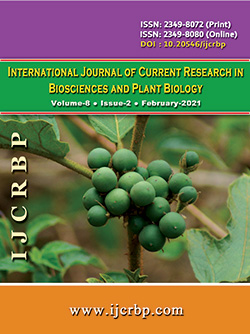 |
Online ISSN : 2349-8080 Issues : 12 per year Publisher : Excellent Publishers Email : editorinchiefijcrbp@gmail.com |
University of Buea, P.O. Box 249 Kumba, Cameroon
2Ministry of Agriculture and Rural Development, Regional Delegation for the South West,
Republic of Cameroon
Secondary salinization of arable lands, and declining irrigation water resources are major challenges for crop production. We investigated synergistic effects of salinity and irrigation on Phaseolus vulgaris L. in a 4 × 3 factorial experiment with four salinity levels (0, 4, 8 and 12 ppt) coupled with 3 irrigation regimes that reflected a deficit, normal and excess irrigation for the region. Growth and ecophysiological variables were measured, and data submitted to Analyses of variance, Correlation and Factor analyses in the Minitab Version 17 software. Salinity stress decreased height (35.05 to 31.97 cm) as salinity increased from 0 to 8 ppt. Number of leaves, number of branches, number of flowers and fruits as well as fruit mass and harvest index all decreased as salinity stress increased. Plants in the deficit irrigation regime had higher water use efficiency (1.27g/l) and transpiration use efficiency (29.51 g/l) compared to those under higher irrigation regimes. Salinity and water stress effects on yield and plant water relations would significantly impede production of this crop, with significant yield losses of over 400% in higher salinities. Therefore measures to alleviate soil salinity are necessary for enhanced P. vulgaris production in such saline contaminated areas.
